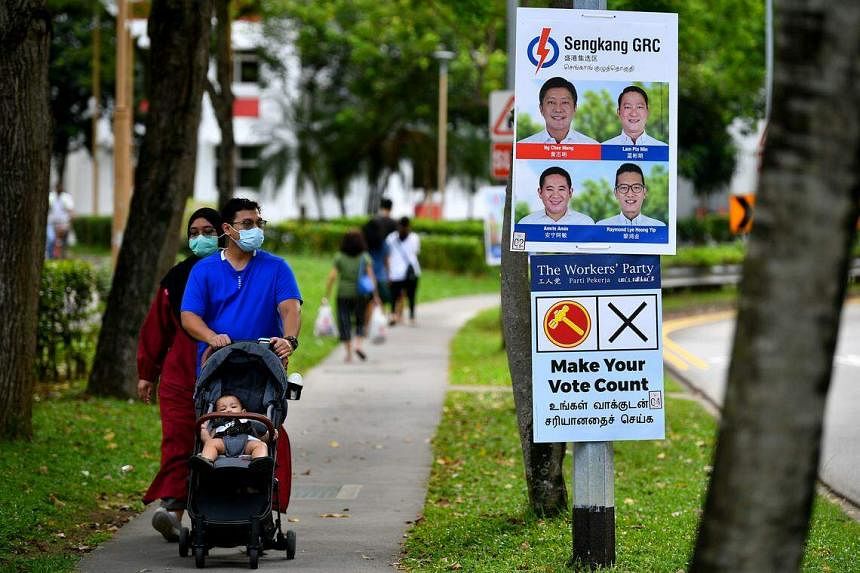SINGAPORE – Singapore’s political parties are seeing more youth participation, and are doing more to draw young people.
The ruling People’s Action Party (PAP) said it has seen “increased youth participation”. The Workers’ Party (WP) – the largest opposition party in Parliament – said the 2020 General Election was “a continuation and deepening of past trends in terms of attracting youth volunteers”.
Meanwhile, the Progress Singapore Party (PSP) said 15 per cent of its members are aged below 35.
While the major parties did not disclose exact figures, volunteers The Straits Times spoke to said they have seen more young volunteers on the ground.
They also explained their reasons for stepping up.
Ms Jakelyn Yong, 22, a PAP youth activist, told ST that being a part of the party with the Cheng San-Seletar branch gives her the opportunity to engage with residents on issues such as women’s development and the needs of the ageing population.
“These are the two causes that are close to my heart, and the experience has been meaningful thus far,” she said.
“Participating in party activities has also enabled me to meet partners from the industry and like-minded individuals, and gain more insights which help me understand the issues. (This helps to) formulate more targeted programmes,” she added.
Her enthusiasm for politics runs contrary to studies here that say Singaporeans are politically uninterested.
A study by the Institute of Policy Studies’ Social Lab, released in 2021, showed that while Singaporeans had a high level of confidence in state institutions and the Government, younger and locally born citizens were less likely to feel this way.
Almost two-thirds were also uninterested in politics, the researchers learnt in examining Singaporeans’ attitudes towards institutions, politics and policies.
Compared with other selected societies, Singaporeans expressed one of the lowest levels of political interest (37.2 per cent), above only Hong Kong (30.4 per cent) and Taiwan (31.6 per cent). In countries such as China, Australia, Sweden and Switzerland, more than 40 per cent of respondents indicated they were very interested or somewhat interested in politics.
Some young people appear to be bucking this trend, and are joining political parties as a way to get involved in issues they care about.
Ms Claudia Selvakumar, 21, has been volunteering with the WP since 2020, spending three to four hours a week making posters and graphics. She says many of her fellow volunteers are around her age.
Her interest in politics was sparked by GE2020, she said.
Ms Selvakumar, who is a polytechnic student, said: “I want to be part of campaigning for what I think is best for Singapore, and I feel like WP’s stances on many issues resonate with me.”
A regional chair of a PAP branch, who declined to be named, said he has seen a distinct uptick in the number of youth volunteers.
The 29-year-old, who has been with the party for 12 years, said many young people want to give back but also want a better understanding of how governance in Singapore works.
He said: “The sense I get is that in this era of increased political contestation, young people feel more of a sense of agency.”
He sees this increased youth participation as a good thing for the party down the line.
“More young people means better leadership in the future, which is absolutely critical to the future of the party,” he said, adding that coming in as a young person allows them to get a real feel of the ground.
But he is concerned about the rate at which he is seeing young people leave.
He said: “About 70 per cent of these volunteers come in and leave very quickly. I’m worried about a rinse-and-repeat effect where we constantly have to teach and re-teach.”
National University of Singapore sociologist Tan Ern Ser said he began to observe a shift away from political apathy in youth in his research as early as 2004.
He told ST: “My own sense is that the propensity for political participation and the desire for checks and balances on the Government have continued to gather momentum – corresponding to concerns about employment and income insecurity, competition from foreign professionals, and the Singapore dream of upward social mobility facing some headwinds.”
He added that the emergence of opposition parties with more credible candidates and greater electability has also served to meet the demand for political participation.
But not everything is about party politics or the opposition.
Said Dr Tan: “The ruling party too, with its various large-scale national conversations, has served to mobilise young Singaporeans... with a platform on which they could be involved in creating the future.”
It is not just national conversations, but also new initiatives like youth panels announced on Friday by Minister for Culture, Community and Youth Edwin Tong. The panels will be led by young people, with support from the National Youth Council and other government agencies.
Some of the volunteers agreed that it is not all about party politics.
Another PAP volunteer, a 21-year-old student who declined to be named, said: “Not all young people volunteer with political parties out of strong political affiliation. It is meaningful work, and offers a unique access point to understanding social issues and public policy in Singapore.”
Regardless, boosting youth participation is something all three parties told ST they remain committed to.
The PSP said its youth members spurred the creation of the party’s TikTok account, and that the party believes in full participation from youth volunteers across its various functions, such as communications and events management.
Ms Nicole Seah, president of the WP’s Youth Wing, said: “Younger volunteers play roles across all of WP, including in the Youth Wing, policy, media and organising teams, as well as our constituency teams.
“Their role is important not only for their contribution but also to ensure a pipeline for succession.”
Ms Nadia Samdin, the MP for Cheng San-Seletar ward, said she appreciates the young people who take their time to share with her their questions and perspectives on social issues and policies.
“This has shaped my speeches on various topics in Parliament for a better future and home in Singapore,” she said.
The PAP said that since the last election, it has increased its efforts to provide clarity on what it is doing to create a fairer, more inclusive and sustainable Singapore.
It added: “We also saw that when the causes resonate and are aligned with our youth and their aspirations, they want to get involved.”


